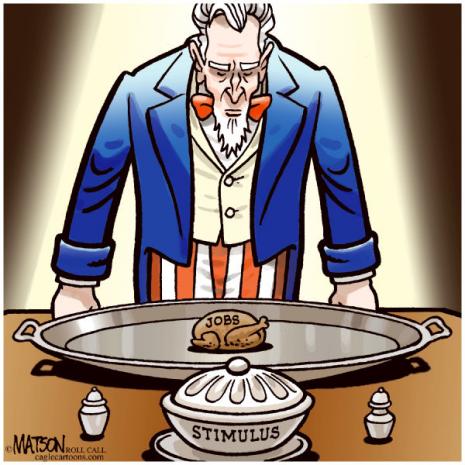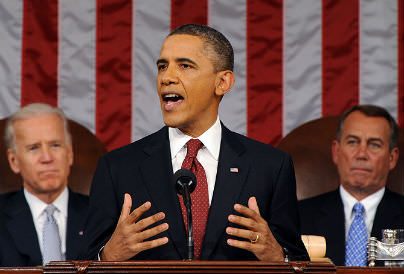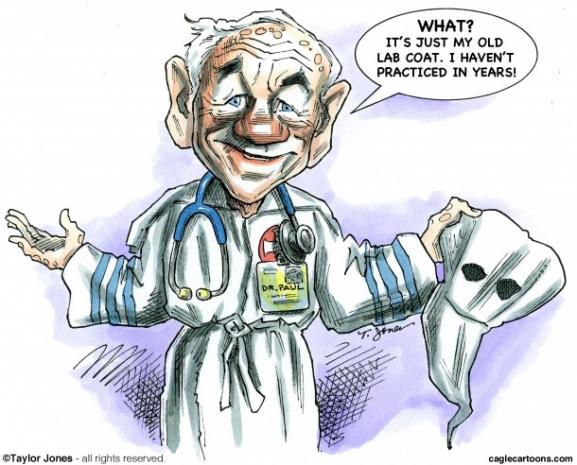Paul pursued strategy of publishing controversial newsletters, associates say
The Republican presidential candidate has denied writing inflammatory passages in the pamphlets from the 1990s and said recently that he did not read them at the time or for years afterward. Numerous colleagues said he does not hold racist views.
Global Main Street Depression
|
||
 |
||
|
|
||
|
Written by Stephen Lendman
Forecasting Economic Decline
by Stephen Lendman
His new book, co-authored with Rodney Johnson, predicts "The Great Crash Ahead." He calls it inevitable and sees protracted trouble worse than 2008. It's coming between 2012 and 2014 he believes. |
Ron Paul calls for diplomatic relations with Cuba

Ron Paul took a risky position
in Florida in Thursday’s debate, calling for communication and
diplomatic relations with Cuba, saying that people's positions have
changed dramatically over the last few years.
Picket: (audio) Fireworks erupt between Gingrich spokesman and Rep. Chaffetz, a Mitt supporter, at Newt event
Prior
House Speaker Newt Gingrich taking the stage at a gathering for the
Republican Jewish Coalition in Del Ray, Florida on Friday afternoon, his
spokesman, R.C. Hammond, confronted Congressman Jason Chaffetz, Utah
Republican and Mitt Romney supporter (who was also with Romney supporter
and conservative movement leader Bay Buchanan) for attending the
Gingrich event.
Obama’s assassination list
American jihadists should be stripped of citizenship, then killed
 U.S.-born radical Islamic cleric Anwar al-Awlaki in Yemen is on a U.S. list of militants to kill or capture. (Associated Press)
U.S.-born radical Islamic cleric Anwar al-Awlaki in Yemen is on a U.S. list of militants to kill or capture. (Associated Press)The American Civil Liberties Union and the Center for Constitutional Rights have brought suit against the Obama administration for ordering the targeted killing of American-born al Qaeda leader Anwar al-Awlaki, who is believed to be holed up in Yemen. These groups argue that the president doesn’t have the legal authority to order the assassination of American citizens. That’s right, so in order for the kill order to stand, Awlaki should be stripped of his citizenship.
Welfare wars: Anatomy of a smear
Liberals vilify any notion that religion could help build stronger families
 Illustration by Greg Groesch for The Washington Times
Illustration by Greg Groesch for The Washington TimesWhen I was a copy editor at the Los Angeles Times, a young reporter submitted an article about a single mother having trouble obtaining government checks.
GOP preparing for 1964-style ‘politicide’?
Internecine warring could hand the victory to Obama
 Illustration by John Camejo for The Washington Times
Illustration by John Camejo for The Washington TimesFleeced by the Fed
 Illustration by Alexander Hunter for The Washington Times
Illustration by Alexander Hunter for The Washington TimesThe Federal Reserve Board announced plans last Tuesday to keep short-term interest rates at near zero for another three years and said it might embark upon another bond-buying program to drive down long-term interest rates. The stock market rallied and President Obama’s supporters hailed the rising stock market as a sign of his brilliance as a manager of the economy.
Newt Gingrich betrayed Ronald Reagan
His vote for Carter’s Department of Education was an early sign
 Illustration by Alexander Hunter for The Washington Times
Illustration by Alexander Hunter for The Washington TimesObama’s crony capitalism
Friends of the president are given billions in government largesse
 A
worker leaves with a moving box Wednesday at Solyndra in Fremont,
Calif. The solar-panel manufacturer, which received a $535 million loan
from the U.S. government, has announced layoffs of 1,100 workers and
plans to file for bankruptcy. A weak economy and strong overseas
competition have proved insurmountable. (Associated Press)
A
worker leaves with a moving box Wednesday at Solyndra in Fremont,
Calif. The solar-panel manufacturer, which received a $535 million loan
from the U.S. government, has announced layoffs of 1,100 workers and
plans to file for bankruptcy. A weak economy and strong overseas
competition have proved insurmountable. (Associated Press)Obama’s next bailout
Proposed settlement hides payoff to banks worth hundreds of billions
 Illustration by Alexander Hunter for The Washington Times
Illustration by Alexander Hunter for The Washington TimesTax the ‘rich’
Capital-gains tax misses the opportunity to spur the economy
 Illustration: Warren Buffett by Alexander Hunter for The Washington Times
Illustration: Warren Buffett by Alexander Hunter for The Washington TimesEach presidential candidate’s position on investment tax rates is a critical issue. The current rates, set by President George W. Bush, will expire at the end of this year, so whoever sits behind the desk in the Oval Office next January will have the power to stop the capital-gains tax rate from jumping to 20 percent and qualified dividends rising to 39.6 percent.
Panetta cites key intelligence on bin Laden raid. By Robert Burns
WASHINGTON (AP) — Defense Secretary Leon Panetta
is acknowledging publicly for the first time that a Pakistani doctor
provided key information to the U.S. in advance of the successful Navy
SEAL assault on Osama bin Laden’s compound last May.
The Political Cowardice of Barack Obama
Soaring rhetoric won't fix the economy.
Now, a return to the American values of fair play and shared responsibility will help protect our people and our economy. But it should also guide us as we look to pay down our debt and invest in our future.—President Barack Obama, State of the Union, January 24, 2012
 President Barack Obama’s State of the Union
address Tuesday night was the latest reminder that the state of
political discourse in America is shockingly low. I’m not singling
out Obama for special condemnation, given that these addresses
always are a potpourri of banalities, regardless of which president
is offering them. Yet Tuesday’s address was a vivid reminder of the
shoddy thinking so common at the highest level of the federal and
state governments and why we are—in the more precise, but less
lofty words of a former president—in deep doo doo.
President Barack Obama’s State of the Union
address Tuesday night was the latest reminder that the state of
political discourse in America is shockingly low. I’m not singling
out Obama for special condemnation, given that these addresses
always are a potpourri of banalities, regardless of which president
is offering them. Yet Tuesday’s address was a vivid reminder of the
shoddy thinking so common at the highest level of the federal and
state governments and why we are—in the more precise, but less
lofty words of a former president—in deep doo doo.Obama's Bogus Case for Tax Fairness Calling something just does not make it so. Sheldon Richman
In his
State of the Union speech Tuesday night President Obama played
the fairness card in calling for higher taxes on upper-income
people. He said:
[W]e need to change our tax code so that people like me, and an awful lot of Members of Congress, pay our fair share of taxes. Tax reform should follow the Buffett rule: If you make more than $1 million a year, you should not pay less than 30 percent in taxes. [Emphasis added.]And:
When Americans talk about folks like me paying my fair share of taxes, it’s not because they envy the rich. It’s because they understand that when I get tax breaks I don’t need and the country can’t afford, it either adds to the deficit, or somebody else has to make up the difference. . . . [Emphasis added.]
Is it unfair to compare the Obama and Reagan economic recoveries? No
Ronald Reagan inherited a Long Recession. The economy declined
0.3 percent in 1980, grew at a subpar 2.5 percent in 1981, and then
plunged 1.9 percent in 1982. The lengthy downturn was really the
culmination of more than a decade of bad economic policy. But the Reagan
Recovery was stunning. GDP rose 4.5 percent in 1983 and 7.2 percent in
1984. It was Morning in America, and Reagan won reelection by a
landslide.
How to Think about Private Equity
If the overall pattern is so positive—for investors, companies, and even employment—why is private equity so controversial?
The Problem with Bambi-nomics
On Mitt Romney, Bain Capital, and modern political discourse.
Businesses that do what Bain does are sensitive about the common analogy comparing them to scavenger species in nature. In large part this is owing to how we are trained from childhood to think of nature in terms of postcard vistas, pettable furry things with large eyes, and the romantic notion of some sort of sweetly cooperative community of creatures. We tend not to teach children about vultures, fungi, slime molds, or maggots. More importantly, we do not teach them why such things are every bit as important to the ecology as Bambi. Without them, the world would soon be tree-deep in corpses, large and small, and life would become impossible. With them, the soil is constantly enriched with recycled nutrients, and life continues abundant. But this kind of comparison clearly doesn't help Bain's image very much.
Fixing Student Loans: Let’s Give Colleges Some ‘Skin in the Game’
What lessons on student loans can be learned from the searing national misadventure with mortgages?
Professor Richard Vedder, considering the question of a student loan bubble, recently concluded that the worst idea ever “was the creation of federally subsidized student loans in the first place.” Can any lessons from the searing national misadventure with mortgages be usefully applied to student loans? I believe so.
A principal lesson from mortgages, nearly universally agreed upon, is that those who create the mortgages should retain a material part of the credit risk. Such “skin in the game” obviously aligns the incentives of the originator of the loan with taxpayer guarantors to control excesses in debt expansion. For mortgages, this “skin in the game” concept was adopted by the Dodd-Frank Act of 2010. More importantly, its advantages are displayed by one of the highest quality mortgage portfolios that exist today: the Mortgage Partnership Finance (MPF) mortgages of the Federal Home Loan Banks. All of these MPF mortgages have credit risk retained by the originator, with excellent results for their credit performance. This program has been operating for more than 14 years.
Let’s apply this mortgage lesson to student loans.
Colleges are the effective originators, the promoters, and the chief financial beneficiaries of student loans.Who are the most important parties to have “skin in the game” in student loans? The colleges themselves, of course! They are the effective originators, the promoters, and the chief financial beneficiaries of student loans. It is their rising costs which result in ever more debt and more risk of default for student borrowers and for taxpayers.
The federal student loan programs should simply compel colleges which get proceeds from the programs to maintain a 10 percent first-loss share in the credit performance of the loan. This puts a material risk of excessive and un-repayable debt and of high college costs on those who are promoting the loans. The colleges would stand to take losses on bad loans before the taxpayers, as they should—they would, in financial parlance, be subordinated or “junior” to the taxpayers. A highly desirable improvement in financial structure and incentives!
So, just as for the mortgage lenders, let’s give the colleges some “skin in the game.”
Alex J. Pollock is a resident fellow at the American Enterprise Institute. He led the creation of the MPF program during the 1990s when President and CEO of the Federal Home Loan Bank of Chicago.
Dining with Vultures: Rent-to-Own, the Feds, and the Housing Sector
Distressed asset buyers are either ruthless or go bust, and government entities have no business co-venturing with them.




No hay comentarios.:
Publicar un comentario